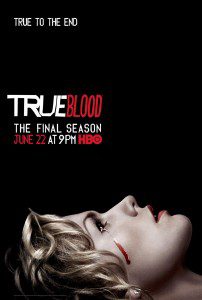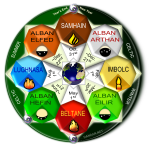 There are no final episode spoilers in this review, although it does discuss the episode in general terms. There are spoilers for earlier in Season 7.
There are no final episode spoilers in this review, although it does discuss the episode in general terms. There are spoilers for earlier in Season 7.
I’ve always loved supernatural horror. I grew up rushing home from elementary school to watch the original Dark Shadows. I love the Universal monster movies of the 1930s and 1940s and Bram Stoker’s Dracula is rapidly catching up with Bela Lugosi’s 1931 version as my most-watched movie of all time.
So when HBO brought Charlaine Harris’ Sookie Stackhouse series to TV in 2008 I reserved Sunday evenings for watching. I had read all the books up to that point (and have since read the last ones) and while I’ve learned never to expect movies or TV shows to be just like the books, HBO has a reputation for producing high-quality shows. I was optimistic.
True Blood got off to a good start. The first season was a fairly close adaptation of the first book Dead Until Dark. The casting was both brilliant and beautiful. The show was sexy and smart and the vampirism-as-metaphor-for-homosexuality was clear and moving without forgetting that vampires are supposed to be vampires (Twilight, I’m yelling at you).
The character changes from the books generally worked well. Tara went from a mousey white girl to a brash African-American, Lafayette didn’t die as he did in the first book, and Jessica was added as a new character at the end of the first season.
But despite the heavy accents and the iconic images of the opening credits, True Blood never got the essential Southernness of the books. Charlaine Harris wrote about the South I grew up in: family, manners, food, and pretending to mind your own business while gossiping about everybody else’s. And although there isn’t a lot of explicit religion in the books – far less than the poorly-conceived Lilith-worship of Season Five – they’re built on a foundation of low-church Protestant Christianity. Characters at least occasionally go to church, they pray when they’re in trouble, and they sometimes worry about their souls… although those worries seldom cause them to change the way they live.
The biggest difference is that the books are narrated by Sookie – everything comes through her point of view. Moving away from that let True Blood run multiple storylines, some of which were entertaining and some of which were not.
I never identified with Sookie like I do with some fictional characters, but I enjoyed watching her grow in the books from a scared young woman who didn’t know what to do with her telepathy to a strong adult who could hold her own in the supernatural community. She also grew from someone who constantly acted out of impulse to someone who learned to think through problems and make good decisions.
True Blood Sookie embraced her sexuality, but other than that she never really grew up, and in some ways became more reactive as the seasons went on.
Seasons Two, Three and Four loosely followed the books – I’d say they were “inspired by” rather than “based on.” The storylines weren’t all good, but most were, and the show remained sexy. I found it amusing that all the main male actors were naked at one time or another, but of the main female actors only Anna Paquin did full nudity. I suppose that’s payback for about a million other films and shows where the female to male nudity ratio approaches infinity.
Season Five struck out on its own, and as I wrote in 2012, it didn’t really work. I hated what they did with Bill – he was always a gentleman, even when he wasn’t honest with Sookie. Season Five turned him into a megalomaniac and it wasn’t fun to watch. Viewers dropped 6%, and although True Blood was renewed it was only for 10 episodes instead of the previous 12.
Show creator Alan Ball left before Season Six and both the quality and the audience took a further dive. The acting remained strong, but the writing was awful. I can’t tell you how many times I screamed at the TV “who’s writing this crap?!” Plots were weak and characters were behaving horribly out of character – not in comparison with the books, but in comparison with what they had established in previous episodes. Not even Anna Paquin’s good acting could make Sookie believable.
At the end of last season, True Blood was renewed for another 10 episodes, but it was announced that Season Seven would be the last. I wasn’t upset. By that time I was watching more from habit than from the enjoyment it brought.
This season has been a continuation of last season’s bad writing. They killed Tara in the first episode and Alcide in the third and I assumed it would be a bloodbath to the finish, particularly when Eric turned up with Hep-V. But the other major characters hung on to the end, and the pace of the show slowed to a crawl. It was like the writers didn’t want to bother with a big story arc in the final season.
Beginning with Season Five the writers made a huge mistake: they spent too much time trying to send political and social messages and not enough time telling good stories. I agree with their messages, but if you want to preach a sermon, just preach. I’m a fan of good preaching – I do it myself every now and then.
But when I’m watching or reading fiction I don’t want a sermon. Entertain me, challenge me, inspire me, or stimulate me, but don’t preach at me. Tell good stories!
That brings us to tonight’s series finale. As with everything else this season, the active scenes felt rushed and the rest of the episode felt stretched, like the writers didn’t know how to fill out the time so they just filmed the first thing that came to mind. Pam and Eric’s ending was badly out of character for them (but did you catch the Charlaine Harris cameo?), Bill’s ending was dissatisfying and the final scene was simply too perfect.
And for a show that promoted progressive values constantly if somewhat clumsily, and that in the last 10 minutes had Sookie realizing she had to be true to who and what she is even if it’s often troublesome, her ending was extremely disappointing.
It’s a happy ending, so everybody gets to be normal. Gay, straight, vampire, fae, shapeshifter, sheriff and all – everybody gets a fried turkey and a white picket fence.
No. In a real happy ending, everyone would get to be themselves.
So farewell, True Blood. You were great for a while, but in the end you showed that not even vampires should live forever.

















